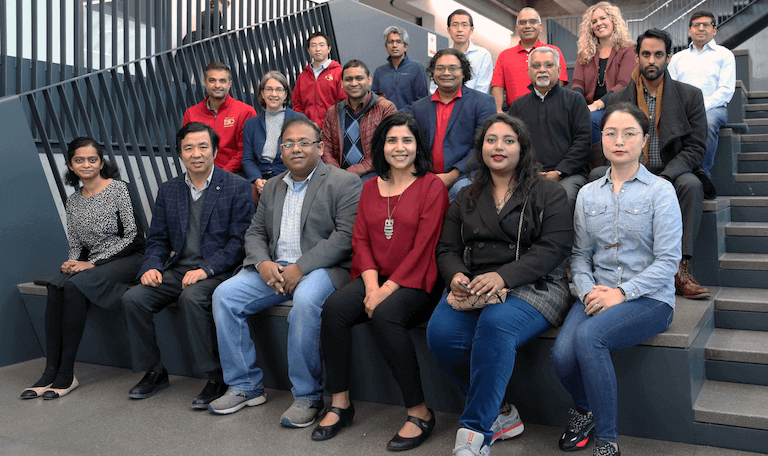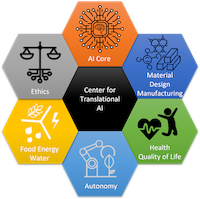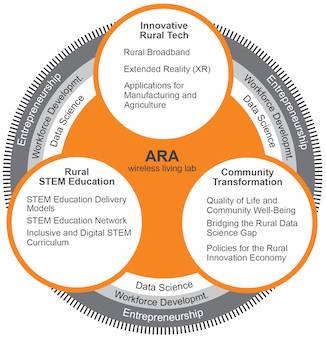Two PIRI Awards Grant $900,000 to Support Translational Artificial Intelligence and Foster Rural Innovation
Posted Nov 29, 2021

The Iowa State University Office of the Vice President for Research has announced two winning teams for the 2021 Presidential Interdisciplinary Research Initiative (PIRI), distributing a total of $900,000 in institutional funding to support two of the largest collaborative initiatives in award history.
Established in 2012 and sponsored by the Office of the President, PIRI provides interdisciplinary research groups funds to pursue large-scale research programs that build on the university’s reputation for innovation and hold the potential to secure future external research grants and contracts. For the 2021 award cycle, two teams led by associate professor of mechanical engineering Soumik Sarkar, and professor of electrical and computer engineering Hongwei Zhang and professor of architecture Kimberly Zarecor, were each recently selected to receive $450,000 in PIRI funding over the next three years.
Sarkar, along with a 40-person research team, will work to establish Iowa State as a leading research institution in the field of translational artificial intelligence (AI) through the creation of a new center on campus, called TrAC (Translational AI Center). In the other project – known as TechTHRIVE – principal investigators Zhang and Zarecor and fellow leadership team members Evrim Baran, associate professor of education, and Eliot Winer, professor of mechanical engineering are working closely with 15 additional collaborators to re-envision rural towns as key nodes in the innovation economy. Together, the team will promote and enable cutting-edge technologies and STEM educational initiatives for rural communities that will help attract and retain a skilled workforce.
“These two projects led by Dr. Sarkar, and Drs. Zhang and Zarecor, are stellar examples of the power of interdisciplinary team research,” said Iowa State University Vice President for Research Peter Dorhout. “Both projects, in their own way, are focused on breaking down barriers and bringing together a multitude of disciplines and perspectives to create innovative solutions that have the potential to deliver real, lasting impact to the people and the economies of Iowa and the nation. Each project embodies the spirit of the PIRI program.”
Breaking Down Disciplinary Silos in Artificial Intelligence
In recent years, the Iowa State research community has explored artificial intelligence as a powerful, yet evolving, tool to bolster work in various domains and applications, including agriculture, manufacturing, healthcare, and transportation. Most were independent efforts, involving small teams lacking institution-wide structure.
 The new Translational AI Center will break down what Sarkar and his team refer to as “disciplinary silos” to bring together core Iowa State artificial intelligence researchers and subject matter experts interested in applying new technologies to their work. The center will initially focus on conducting core artificial intelligence research, as well as pursuing five application areas of artificial intelligence:
The new Translational AI Center will break down what Sarkar and his team refer to as “disciplinary silos” to bring together core Iowa State artificial intelligence researchers and subject matter experts interested in applying new technologies to their work. The center will initially focus on conducting core artificial intelligence research, as well as pursuing five application areas of artificial intelligence:
- Materials design and manufacturing;
- Biology, healthcare, and quality of life;
- Autonomy, intelligent transportation, and smart infrastructure;
- Food, energy, and water; and
- Ethics, fairness, and adoption.
In addition to serving as a scientific hub for translational artificial intelligence, the center will organize seminars designed to increase the visibility of related Iowa State research, host workshops, training, and on-boarding programs, offer seed funding for research projects, and serve as an intermediary between private industry partners seeking research services and appropriate university faculty.
“Our team feels that there is a need for a center dedicated to the subject matter of translational AI,” said Sarkar, who will serve as the center’s director. “In recent years, everyone has been jumping on the AI bandwagon. There have been many pockets of university researchers, in specialties ranging from engineering to biology, that have been utilizing AI technologies. But there is no cohesive entity that focuses on translating AI developments to specific applications. Our goal is to pursue the translating process, to bring all these key players together and create a plan so more people can utilize these powerful tools.”
The center will also serve as home base for another recently announced university-led and government-funded artificial intelligence initiative, the AI Institute for Resilient Agriculture (AIIRA). The new institute, announced in July, will receive $20 million in funding from the National Science Foundation (NSF) and the U.S. Department of Agriculture (USDA) National Institute of Food and Agriculture (NIFA). AIIRA will bring AI experts together with plant breeders, agronomists, geneticists, and social scientists to accelerate the adaptation and use of AI-based technologies to transform agriculture to meet the needs of our world’s growing population and increasingly climate-challenged food systems.
In total, the creation of the Center for Translational AI effort brings together 40 faculty members already involved in artificial intelligence or machine learning, representing all seven of the university’s colleges.
“Together, we have a shared vision that will make Iowa State a major thought leader in translational AI, with the potential to have a major impact in the field,” said Anderlik professor of mechanical engineering Baskar Ganapathysubramanian, deputy director of the Translational AI Center. “We are incredibly excited that this vision is now supported by infrastructure and funds, and we encourage the campus community to explore if AI can benefit their work.”
Project Investigators
- PI: Soumik Sarkar, Mechanical Engineering
- Julie Dickerson, Electrical and Computer Engineering
- Shawn Dorius, Sociology
- Baskar Ganapathysubramanian, Mechanical Engineering
- James Koltes, Animal Science
- Adarsh Krishnamurthy, Mechanical Engineering
- Hailiang Liu, Mathematics
- Jennifer Margrett, Human Development and Family Studies
- Dan Nettleton, Statistics
- Janette Thompson, Natural Resource Ecology and Management
- Asheesh Singh, Agronomy
- Lizhi Wang, Industrial and Manufacturing Systems Engineering
Reimagining the Roles of Rural Communities
Rural communities in Iowa and across the United States often struggle to participate in today’s technology-driven economies, due to factors such as lagging high-speed broadband internet, shortages of STEM teachers and workforce development opportunities, and limited access to high-quality social services and medical care. In addition, the populations of most rural counties are shrinking — with the Midwest seeing the largest declines nationally since 2000. As a result, a growing cultural and economic divide has emerged between people living in cities and those in rural locations.
Zhang, Zarecor and their expanded team intend to tackle these challenges head-on through TechTHRIVE: A Technological Vision for Thriving Rural Communities in an Innovation Economy. Together, they are focused on breaking the cycle of rural communities that have been left behind by creating a new future for non-urban America, notably marked by small towns assuming new roles within the economy.
 TechTHRIVE will be built on three interconnected research themes: innovative technologies for rural applications (led by Winer and Zhang); rural STEM education (led by Baran); and rural community transformation (led by Zarecor). The main goal of the initiative is to establish Iowa State as a national leader in promoting and enabling a rural innovation economy that will bring new industries and high-skilled, high-paying jobs to rural places. The key components of the TechTHRIVE mission include supporting rural-focused technology innovation, fostering new business creation and entrepreneurship, and enriching small-town quality of life. If successful, these efforts will encourage more young people and working professionals to stay in and return to small towns to raise families and pursue their livelihoods.
TechTHRIVE will be built on three interconnected research themes: innovative technologies for rural applications (led by Winer and Zhang); rural STEM education (led by Baran); and rural community transformation (led by Zarecor). The main goal of the initiative is to establish Iowa State as a national leader in promoting and enabling a rural innovation economy that will bring new industries and high-skilled, high-paying jobs to rural places. The key components of the TechTHRIVE mission include supporting rural-focused technology innovation, fostering new business creation and entrepreneurship, and enriching small-town quality of life. If successful, these efforts will encourage more young people and working professionals to stay in and return to small towns to raise families and pursue their livelihoods.
New workforce development models will also be designed to engage an untapped population of potential STEM workers and entrepreneurs already residing in these communities.
“As members of the Iowa State research community, our team wants to envision a future for rural Iowa that brings it more in line with the growing innovation economy, diversifying the state’s economic base and creating a new set of professional jobs, careers, and incomes that will give young people a reason to stay here, rather than flocking to the coasts,” Zarecor said. “We need to diversify what those opportunities are by making Iowa not just a receiver of technological innovations, but a hub for new ideas and technologies that are created here, nurtured here, and that bring the financial benefits back to rural Iowa communities.”
The TechTHRIVE project will operate in tandem with the recently announced ARA: Wireless Living Lab for Smart and Connected Rural Communities project, led by Zhang, which will bring a wide range of wireless technologies to Iowa State, the city of Ames, and surrounding farms and rural communities in central Iowa. The TechTHRIVE initiative is a natural expansion of the scope of the ARA project, Zhang said, as the vision of the project is driven by the infrastructure provided by ARA, and likewise, TechTHRIVE will reinforce the mission of ARA in the long term.
“At their core, this project and ARA are about innovation and community building,” Zhang said. “The question our PIRI team hopes to answer is how we can build a community that drives important initiatives together. Likewise, ARA represents an opportunity to make broadband internet an innovation space, not just a service. We will investigate use cases for ARA, test new technologies and educational strategies, and pursue community pilot studies that leverage the wireless technology ARA will provide. Perhaps most importantly, we will develop relationships and partnerships with Iowa communities, so that this new economic base is created in collaboration with stakeholders.”
Project Investigators
- Project Co-Leader/Co-PI: Kimberly Zarecor, Architecture
- Project Co-Leader/Co-PI: Hongwei Zhang, Electrical and Computer Engineering
- Project Co-Leader: Evrim Baran, Education
- Project Co-Leader: Eliot Winer, Mechanical Engineering
- EunJin Bahng, Education
- Carlos Cardoso, Industrial Design
- Thomas Daniels, Electrical and Computer Engineering
- Anindita Das, 4-H Youth Development Program, ISU Extension and Outreach
- Stephen Gilbert, Industrial and Manufacturing Systems Engineering
- Donghyuk Kim, Economics
- Rami Mannan, Architecture
- Peter Orazem, Economics
- Diane Rover, Electrical and Computer Engineering
- Ben Shirtcliff, Landscape Architecture
- Roy Sturgill, Civil, Construction, and Environmental Engineering
- Dara Wald, Journalism and Communication
- Caroline Westort, Landscape Architecture
- Mat Wymore, Electrical and Computer Engineering
- Zhengyuan Zhu, Statistics
About PIRI
The Presidential Interdisciplinary Research Initiative (PIRI) is designed to lead directly to the advancement of significant interdisciplinary research strengths that generate a transformational impact at the university, across sectors, and throughout the state and nation. PIRI proposals may be submitted by teams composed of a lead faculty investigator and a core group of five to 10 Iowa State University faculty and staff members. The lead faculty investigator must be a full or associate professor at Iowa State, and the team must include participants from multiple academic units and colleges on campus. More information about the PIRI can be found here.
